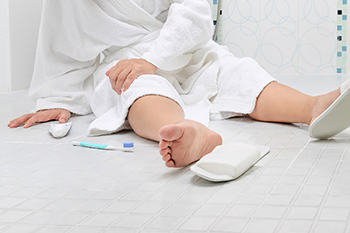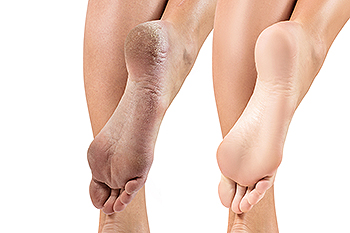Connect With Us
Blog
Items filtered by date: January 2025
Shower Falls Prevention Tips

Preventing falls in the shower is essential to protect your feet and ankles from injury. Start by ensuring the shower floor is slip-resistant. Use non-slip mats or adhesive strips to improve traction. Installing grab bars inside and outside the shower provides extra stability, especially when entering or exiting. A sturdy shower chair can be helpful for those with balance concerns or limited mobility. Use a handheld showerhead to reduce movement and maintain control while washing. Keep soap and toiletries within easy reach to avoid overextending or bending awkwardly. Good lighting in the bathroom also helps prevent missteps. Regularly inspect the shower area for hazards, such as loose tiles or leaking water. Wearing shower-safe, non-slip footwear adds another layer of safety. If you experience a fall or suspect a foot or ankle injury, it is suggested that you promptly see a podiatrist for evaluation and care.
Preventing falls among the elderly is very important. If you are older and have fallen or fear that you are prone to falling, consult with Scott Amoss, DPM from Advanced Foot & Ankle Specialists. our doctor will assess your condition and provide you with quality advice and care.
Every 11 seconds, an elderly American is being treated in an emergency room for a fall related injury. Falls are the leading cause of head and hip injuries for those 65 and older. Due to decreases in strength, balance, senses, and lack of awareness, elderly persons are very susceptible to falling. Thankfully, there are a number of things older persons can do to prevent falls.
How to Prevent Falls
Some effective methods that older persons can do to prevent falls include:
- Enrolling in strength and balance exercise program to increase balance and strength
- Periodically having your sight and hearing checked
- Discuss any medications you have with a doctor to see if it increases the risk of falling
- Clearing the house of falling hazards and installing devices like grab bars and railings
- Utilizing a walker or cane
- Wearing shoes that provide good support and cushioning
- Talking to family members about falling and increasing awareness
Falling can be a traumatic and embarrassing experience for elderly persons; this can make them less willing to leave the house, and less willing to talk to someone about their fears of falling. Doing such things, however, will increase the likelihood of tripping or losing one’s balance. Knowing the causes of falling and how to prevent them is the best way to mitigate the risk of serious injury.
If you have any questions, please feel free to contact our offices located in Whiting and Toms River, NJ . We offer the newest diagnostic and treatment technologies for all your foot care needs.
Causes and Prevention of Cracked Heels

Cracked heels are a common foot problem that can cause discomfort and pain. One of the main causes is pressure on the feet, especially from prolonged standing or walking, which can lead to the skin thickening and cracking. Wearing improper footwear is another significant factor, as shoes that do not provide proper support or fit can increase friction on the heels, contributing to dryness and cracking. Obesity can also play a role, as excess weight places additional stress on the feet, causing the skin to stretch and crack more easily. As people age, the skin loses moisture and elasticity, making the heels more prone to dryness and cracks. To prevent cracked heels, it is important to wear well-fitting shoes that provide adequate support and cushioning. Regular moisturizing and maintaining a healthy weight can also help keep the feet smooth and prevent cracking. Cracked heels can be painful. If you have developed this condition, it is strongly suggested that you consult a podiatrist who can prescribe medication for effective relief and treatment.
If the skin on your feet starts to crack, you may want to see a podiatrist to find treatment. If you have any concerns, contact Scott Amoss, DPM from Advanced Foot & Ankle Specialists. our doctor can provide the care you need to keep you pain-free and on your feet.
Cracked Heels
It is important to moisturize your cracked heels in order to prevent pain, bleeding, and infection. The reason cracked heels form is because the skin on the foot is too dry to support the immense pressure placed on them. When the foot expands, the dry skin on the foot begins to split.
Ways to Help Heal Them
- Invest in a good foot cream
- Try Using Petroleum Jelly
- Ease up on Soaps
- Drink Plenty of Water
Ways to Prevent Cracked Heels
- Moisturize After Showering
- Skip a Shower
- Keep Shower Water Lukewarm
- Don’t Scrub Your Feet
If you are unsure how to proceed in treating cracked heels, seek guidance from a podiatrist. Your doctor will help you with any questions or information you may need.
If you have any questions, please feel free to contact our offices located in Whiting and Toms River, NJ . We offer the newest diagnostic and treatment technologies for all your foot care needs.
Non-Injury Causes of Foot Pain

Foot pain can arise from a variety of non-injury causes unrelated to exercise or repetitive stress. Skin issues like calluses, corns, or warts can create discomfort, particularly when they develop on weight-bearing areas of the feet. Conditions like athlete’s foot or contact dermatitis may cause itching, redness, and peeling skin. Joint-related problems, such as bunions, hammertoes, or arthritis, can lead to pain, swelling, and limited mobility. Nerve-related conditions, including Morton's neuroma or tarsal tunnel syndrome, often cause burning, numbness, or tingling sensations in the toes or feet. Circulation problems, such as those associated with diabetes or peripheral arterial disease, can result in nerve damage and lead to numbness, burning, or a lack of sensation in the feet. Age-related changes, including thickened nails or foot spreading, can also contribute to discomfort. A podiatrist is well-equipped to evaluate and manage these non-injury foot pain conditions through diagnostic techniques and personalized treatment options. If you are experiencing foot pain, it is suggested that you schedule an appointment with a podiatrist for a diagnosis and treatment options.
Foot Pain
Foot pain can be extremely painful and debilitating. If you have a foot pain, consult with Scott Amoss, DPM from Advanced Foot & Ankle Specialists. our doctor will assess your condition and provide you with quality foot and ankle treatment.
Causes
Foot pain is a very broad condition that could be caused by one or more ailments. The most common include:
- Bunions
- Hammertoes
- Plantar Fasciitis
- Bone Spurs
- Corns
- Tarsal Tunnel Syndrome
- Ingrown Toenails
- Arthritis (such as Gout, Rheumatoid, and Osteoarthritis)
- Flat Feet
- Injury (from stress fractures, broken toe, foot, ankle, Achilles tendon ruptures, and sprains)
- And more
Diagnosis
To figure out the cause of foot pain, podiatrists utilize several different methods. This can range from simple visual inspections and sensation tests to X-rays and MRI scans. Prior medical history, family medical history, and any recent physical traumatic events will all be taken into consideration for a proper diagnosis.
Treatment
Treatment depends upon the cause of the foot pain. Whether it is resting, staying off the foot, or having surgery; podiatrists have a number of treatment options available for foot pain.
If you have any questions, please feel free to contact our offices located in Whiting and Toms River, NJ . We offer the newest diagnostic and treatment technologies for all your foot care needs.
Ankle Fracture? Don’t Wait for Treatment
Essential Diabetic Foot Care

Regular foot care is essential for people with diabetes, as high blood sugar can lead to nerve damage known as neuropathy, and poor circulation, making feet more vulnerable to injury and infection. Symptoms often include numbness, tingling, or a loss of sensation in the feet, making it difficult to feel cuts, blisters, or sores. If left untreated, even minor injuries can lead to serious complications, including ulcers and infections. The primary causes of foot issues in diabetics patients are nerve damage, poor circulation, and reduced ability to heal wounds. Diabetic individuals may also experience dry skin, calluses, or fungal infections. A podiatrist can provide essential care, including regular foot exams, wound care, and preventative treatments. They may recommend custom shoes or orthotics to reduce pressure points, prescribe medications for infections, and teach proper foot hygiene techniques. If you have diabetes, it is suggested that you are under the care of a podiatrist who can help you to manage this serious condition.
Diabetic foot care is important in preventing foot ailments such as ulcers. If you are suffering from diabetes or have any other concerns about your feet, contact Scott Amoss, DPM from Advanced Foot & Ankle Specialists. our doctor can provide the care you need to keep you pain-free and on your feet.
Diabetic Foot Care
Diabetes affects millions of people every year. The condition can damage blood vessels in many parts of the body, especially the feet. Because of this, taking care of your feet is essential if you have diabetes, and having a podiatrist help monitor your foot health is highly recommended.
The Importance of Caring for Your Feet
- Routinely inspect your feet for bruises or sores.
- Wear socks that fit your feet comfortably.
- Wear comfortable shoes that provide adequate support.
Patients with diabetes should have their doctor monitor their blood levels, as blood sugar levels play such a huge role in diabetic care. Monitoring these levels on a regular basis is highly advised.
It is always best to inform your healthcare professional of any concerns you may have regarding your feet, especially for diabetic patients. Early treatment and routine foot examinations are keys to maintaining proper health, especially because severe complications can arise if proper treatment is not applied.
If you have any questions please feel free to contact our offices located in Whiting and Toms River, NJ . We offer the newest diagnostic and treatment technologies for all your foot and ankle needs.

